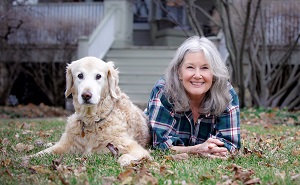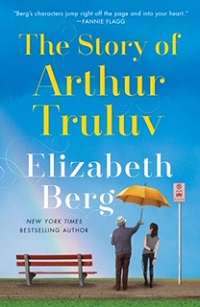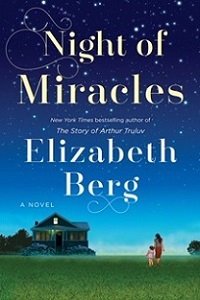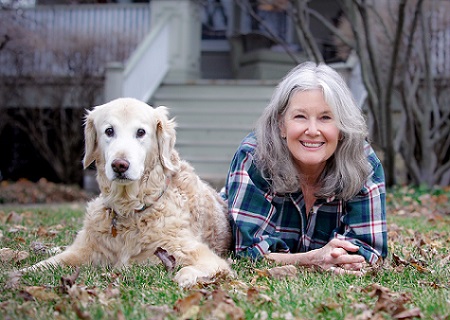
 |
|
Credit: Teresa Crawford |
Since its publication in 2017 readers have fallen in love with the characters in Elizabeth Berg’s emotionally powerful novel, The Story of Arthur Truluv. And, they have embraced its uplifting messages of friendship, community, second chances, and the possibility of achieving happiness at any age.
The editors at Random House Reader’s Circle had a chance to sit down with Elizabeth Berg to discuss her inspiration, first loves, and pie.
Random House Readers Circle: Arthur and Maddy’s unusual friendship is the heart of The Story of Arthur Truluv, and it’s something that readers have been particularly drawn to. What is it that brings these quite dissimilar people together? Have you ever had a friendship with someone very different from yo u that greatly affected your life?
u that greatly affected your life?
Elizabeth Berg: Both Maddy and Arthur are, however unconsciously, looking for a kind of love as a replacement for what they have lost—or, in Maddy’s case, never had. They accept each other as they are, a necessary component in any good friendship. I’ve always appreciated and enjoyed older people. As a nine-year-old, I once made a dear friend in a woman who was probably Arthur’s age, and she spoke only German. She used to sit out on the back stoop and I would come over and visit with her and try to teach her English by showing her animals in my favorite book. Not much English got learned, and not much German, either, but we very much enjoyed each other. There was a great warmth that came from her to me, and vice versa.
RHRC: Lucille finds love and happiness again when she reconnects with Frank. Do you think we ever get over our first loves? Is it ever too late in life to start over again?
EB: I never got over my first love! And no, I don’t think it’s ever too late for love. We always have that particular porch light on. I think many of us have fantasies about seeing “that one” again, meaning someone who had a profound effect on us, someone we loved very much but lost for some reason or another. For Lucille and Frank, it’s almost an extreme example of that happening, in that they are so old when they get back together. But what they both learn quickly, and in a very visceral way, is that the emotions that fuel love are ageless; they live in our heart, and therefore operate independently of our bodies. And I believe there is a particular sweetness that comes with love in older people. They’ve been around the block; they’ve suffered some wounds, and here they are, still going. What a wonderment to understand that you have a second chance at love and romance and companionship at a time when your junk mail is full of requests for you to will your estate money to this organization or that! What a pleasure to know that someone loves you for what’s inside, because for both of you, your outsides are shot! Frank and Lucille are taken up by the breathlessness and joy and comfort and just plain fun of a relationship. Now, more than ever, they want to get all they can out of life. What a blessing!
RHRC: Arthur has a very unique nickname, “Truluv,” which Maddy comes up with after hearing how much he loved his wife, Nola. How did you come up with the name “Truluv”? What do you think “true love” means in this novel? What does it mean to you?
EB: I was riding a bus once, and the driver’s name was Truelove Moses. (Although, now that I think of it, maybe it was Moses Truelove.) Anyway, I thought it was the most wonderful name. I asked if I could use it sometime, and he said sure. It was [my editor] Kate’s idea to change it to Truluv.
I think the kind of love that comes after romantic love is the best, richest love of all. At some point, I think we all want someone we can look ugly around, reveal our vulnerabilities to, and, most important, trust. And as a former nurse, I found that when people are at their most vulnerable, at their “ugliest,” is when they’re the most beautiful. In this novel, I think true love is saying, “I see you wholly and I love you anyway.”
RHRC: Lucille’s baking is one of the great treasures of this book. Why did you decide to make her a talented baker? Are you a baker yourself?
EB: When I write fiction, the characters write themselves. So it was Lucille who made herself a baker extraordinaire. I was thrilled, because I love to write about food. I am a baker, though a pretty unexciting one—I just follow the recipe. I do make a terrific pie crust, but my daughter, Julie, has it all over me when it comes to baking.
By the way, my pie crust came from a woman in the audience on The Phil Donahue Show who rattled it off, and it was easy to remember. I’ve used it ever since.

The many fans of The Story of Arthur Truluv will be excited to revisit the town of Mason, Missouri in Berg’s newest novel, Night of Miracles—another a heartwarming novel that reminds us that the people we come to love are often the ones we don’t expect.
Click to Read an Excerpt from Night of Miracles.
Click for Discussion Questions for Night of Miracles.
Click for Discussion Questions for The Story of Arthur Truluv.
Click for Elizabeth Berg’s Pie Crust Recipe.
Originally published on Random House Reader’s Circle.
SPONSORED BY
ALREADY A SUBSCRIBER? LOG IN
We are currently offering this content for free. Sign up now to activate your personal profile, where you can save articles for future viewing





Comment Policy:
Comment should not be empty !!!